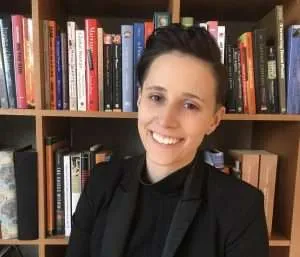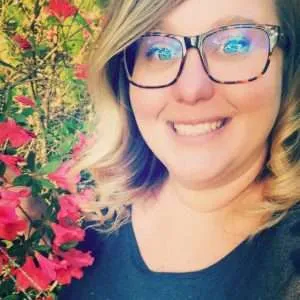Editorial Note:
This profile of Karen Albright, PhD is brought to you through a partnership between the Association for Applied and Clinical Sociology (AACS) and Applied Worldwide. Thank you to AACS and all those who made valuable contributions to the Profiles in Applied & Clinical Sociology series.
This profile is presented with the intentions of: 1) providing students with examples of applied sociology, 2) providing market value to sociological skills and services, and 3) promoting the work of individual sociological practitioners and organizations. You can learn more about AACS at AACSnet.net.
Karen Albright, PhD
Dr. Karen Albright earned her PhD in Sociology from New York University. She received additional training as “a Robert Wood Johnson Foundation Postdoctoral Fellow in the Scholars in Health Policy Research Program at the University of California – Berkeley, and as a NIMH Postdoctoral Fellow in the Center for Culture and Health, Semel Institute for Neuroscience and Human Behavior, David Geffen School of Medicine, University of California – Los Angeles.” Her Fellowship with UCLA, which was held jointly with Stanford University, provided her with focused training on mental health and health disparities.
One of Dr. Albright’s many roles is Co-Director of Lacuna Analytics, “a company which provides a variety of methodological services designed to address organizations’ data analytics and implementation needs.” When we asked her about her work with Lacuna Analytics, she told us:
“I collaborate with and consult for a wide variety of community, medical, non-profit, corporate, and academic organizations. I provide guidance, tools, and resources to health care organizations and programs seeking to enhance their workflow, productivity, and data utilization.”
Read the full interview with Dr. Albright below to learn more about her impressive sociological career!
Using Sociology in Practice
To begin, can you briefly describe the work you do as an applied or clinical sociologist?
I apply sociology primarily within the health care realm. I am an Associate Professor of Medicine in the Department of General Internal Medicine at the University of Colorado School of Medicine, and Associate Director for Research at the Denver-Seattle Center of Innovation (COIN), Department of Veterans Affairs. I apply sociological methods, theories, and perspectives to medical and public health research; my work focuses on health disparities and the social determinants of mental and physical health among a variety of socioeconomically disadvantaged populations, including Veteran populations. I am particularly interested in understanding factors influencing the health behaviors and outcomes of these populations and identifying barriers to the care they receive. A substantial number or my studies have investigated the perspectives of health care providers, health care staff, patients, and/or patients’ parents toward particular health care approaches, technologies, and experiences in order to identify barriers to their care; many of these publications explicitly compare perspectives across role in order to identify areas of miscommunication and misunderstanding. Much of my work has been concerned with exploring not only individuals’ experiences with the health care system, but also testing potential solutions for improving care.
How did you establish yourself as an applied or clinical sociologist?
Upon receiving my doctorate, I was fortunate to be accepted into the Robert Wood Johnson’s Scholars in Health Policy Research postdoctoral fellowship program at the University of California – Berkeley, a program that was explicitly designed to introduce newly minted PhDs in sociology, political science, and economics to the realm of health care. That was my first inkling that, despite the value of sociological insights in any domain, the discipline had not done a good job of branding itself outside the ivory tower. I loved having the opportunity to apply a sociological lens to the “real world” of health and, indeed, appreciated the health care realm’s insistence on application of findings, rather than simply observation and documentation. After finishing my postdoctoral period, I took a faculty position in the Colorado School of Public Health, and a couple of years later also became Director of the Qualitative Research Core at a Center within the School of Medicine. As my work has continued to evolve in the past decade, I’ve come to believe ever more strongly that sociology as a discipline should move in an applied direction. In an effort to do what I can to facilitate that movement, I currently serve as the President of the Association of Applied and Clinical Sociology (AACS) and as Chair-Elect of the Sociological Practice and Public Sociology (SPPS) section of the American Sociological Association.
In general, how do you use sociology in practice?
As described above, I apply a sociological perspective to my work as a health services researcher. This is most evident in my work on the social determinants of health, which shape health behaviors and outcomes in a wide variety of ways and are very closely related to a sociological focus on inequality. My training as a sociologist also has enabled me to contribute as a systems scientist. In my work at Lacuna Analytics, I use that perspective to provide guidance, tools, and resources to health care organizations and programs seeking to enhance their workflow, productivity, and data utilization.
How do you use sociological research methods in practice?
I am a qualitative methodologist, deeply attuned to environmental nuance, a skill set that I attribute almost entirely to my sociological training. This has served me well my entire career. I was previously the Director of the Qualitative Research Core at the University of Colorado School of Medicine’s Adult and Child Consortium for Health Outcomes Research and Delivery Science (ACCORDS), as well as the Director of the Qualitative Research Core in the Center for Research in Implementation Science and Prevention (CRISP), a Center of Excellence funded by the Agency of Healthcare Research and Quality. These positions gave me a highly visible role at my medical campus, because I was then one of the few faculty members with expertise in qualitative research at a time when funding agencies (e.g., NIH) were beginning to regard mixed methods research (rather than quantitative research alone) as best practice. As Associate Director for Research at the COIN, I have continued to hone my qualitative methodological skill set, and have provided qualitative methodological and analytic expertise to numerous research studies, as well as to many junior investigators (i.e., junior faculty, fellows, and graduate and medical students).
Lessons for Future Practitioners
What types of courses should undergraduate students take in preparation for a career in your type of practice?
Undergraduates should seek to take as many applied sociology classes as possible—classes that provide a hands-on introduction to the application of sociological concepts, skills and tools. These should provide the opportunity to actively analyze and engage problems facing a variety of clients and organizations including business, government, and other community agencies and groups, so that students can learn how to utilize an explicitly sociological perspective and related tools to identify, investigate, and actively seek solutions to issues of structure, process and social change. Internships can be a good opportunity to do some of this work, of course, and those should be taken as much as possible. But actual coursework should also be offered that can facilitate these experiences as well.
What types of courses should graduate students take in preparation for a career in your type of practice?
My answer to the question above, regarding undergraduates, is also relevant for graduate students. In addition to pursuing as many of these practical courses and experiences as possible, graduate students should take as many methods courses as possible, including a wide variety of both qualitative and quantitative (i.e., statistical) methods. Methodological prowess is very valuable (and marketable).
More generally, what are the best outlets to learn more about the work you do as an applied or clinical sociologist?
The Association for Applied and Clinical Sociology (AACS) is a great organization and an excellent resource to learn about applied and clinical sociology. You can learn more about it, and connect with those who work as applied or clinical sociologists, at www.aacsnet.net.
How would you describe the daily life of an applied or clinical sociologist?
Applied and clinical sociologists work in many varied positions, so their daily lives will differ substantially. My own daily work life is filled with meetings with various research partners and consulting clients, during which my team and I seek to understand the problem(s) and approach solutions. It’s a very dynamic process and one that is often invigorating, despite (or because of?) the challenges involved. In my current leadership roles, I also handle a number of administrative and/or visioning tasks aimed at supporting and moving forward the organizations I lead or co-lead.
What advice do you have for aspiring applied and clinical sociologists?
Learn as much as you can about sociological methods and theories, perhaps especially those that allow you insight into the ways that systems work. Embrace the complexity of the real world but also learn how to articulate/translate/communicate the most important take-aways from your work so that you can effectively disseminate them to stakeholders. Think outside the traditional academic box. Seek experiences (and people) that will challenge you and make you grow. Don’t be afraid to network or to ask questions. Remember that no job is too small when you are getting started. Think of sociology as a useful set of tools… and use them to get to work! Good luck!







